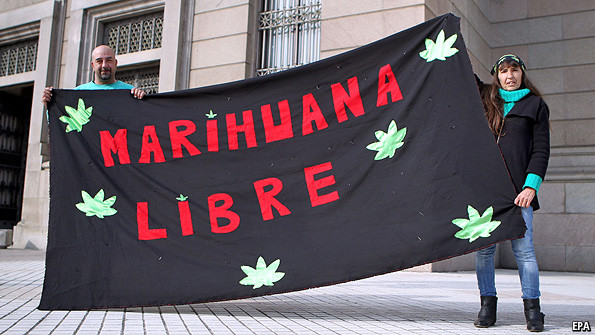The experiment
Another blow against prohibition
AFTER more than a year’s public deliberation and a 14-hour parliamentary debate, on July 31st Uruguay took a big step to becoming the first country in the world to legalise marijuana (cannabis). The lower house of Congress voted on party lines, by 50 to 46, to approve a bill from the left-wing Broad Front government to legalise and regulate the production and sale of the drug. This is now expected to be approved by the Senate, where the Broad Front has a larger majority. If so, Uruguayans will be able to consume marijuana by growing up to six plants at home, by joining a club or by buying up to 40 grams (1.4 ounces) a month from licensed pharmacies.
The bill has faced fierce opposition: a poll last month found 63% against, and opponents claim that consumption will rise. But its supporters argue that drug prohibition has caused more problems—in the form of organised crime and the risks of clandestine consumption—than the drugs themselves.
Uruguay’s vote follows the approval of marijuana legalisation in referendums in Colorado and Washington state in the United States last year. In June foreign ministers of the 34 countries of the Organisation of American States agreed “to encourage the consideration of new approaches” to the drug problem. Reformers hail these steps as breaking a taboo: in place of the straitjacket of universal prohibition imposed by the UN drugs conventions, the Americas are inching towards experiments with alternative policies. That, they hope, will encourage drug policy based on evidence, rather than dogma.
From the print edition: The Americas


